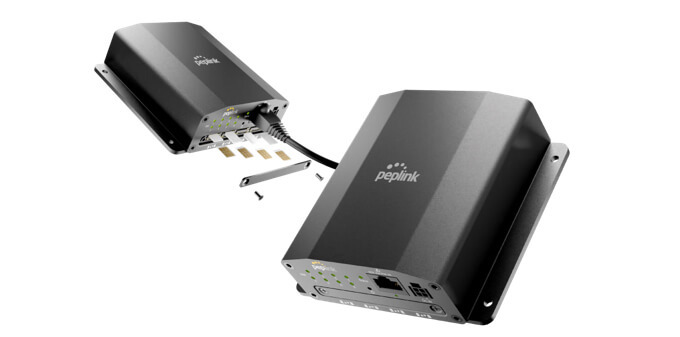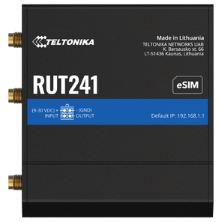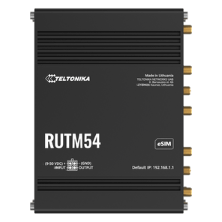How eSIM Technology Makes Cellular Routers More Flexible
eSIM Routers Are the Upgrade You Didn’t Know You Needed
We don’t always give a lot of thought to our cellular routers. For many of us, it’s a stationary box that’s been in our house for years, collecting dust. But now, that’s changed. Thanks to eSIM technology, routers are now more mobile, flexible, and easier to manage than ever before. Whether you’re a remote worker, a small business owner, or simply someone tired of unreliable connectivity, eSIM-enabled routers offer significant advantages.
Today, we’ll break down how eSIM routers differ from traditional SIM routers, what makes them so versatile, and which option is best for your needs.
We fix poor cell phone signal! Find the right signal booster for you:




What is a Traditional SIM Router?
Traditional cellular routers use physical SIM cards to connect to cellular networks. You insert the SIM card manually, often supplied by a carrier like AT&T, Verizon, or T-Mobile, and the router connects based on that network. Some models support two or even four SIM cards, which allows for automatic switching between carriers for redundancy. But even then, it’s a hardware-based swap. If you need to change carriers, you’re looking at removing the old card, inserting a new one, and reconfiguring your setup.

These routers are still widely used in households across the country, but as connectivity needs get more mobile, global, and scalable, traditional SIM-based setups start to show their limits.
What is an eSIM Router?
An eSIM (Embedded SIM) router works differently. Instead of using a physical SIM card, it relies on software-based SIM profiles stored within the device itself. You don’t need to pop open a SIM tray or fumble with tools.
These routers can store multiple carrier profiles and switch between them remotely and tap into 4G or 5G networks. That means no waiting on a SIM card to arrive in the mail. No tracking which card belongs to which carrier. And no physical handling at all, unless you’re using a model that still accepts a backup card.
eSIM routers are more than just an evolution of traditional routers; they're also a step above most hotspot routers. While hotspot routers are designed primarily for consumer-level short-term usage, eSIM routers are built for longevity, remote management, and heavy-duty performance in business, industrial, and multi-device environments.
That’s why they’ve become popular in enterprise networks, global IoT rollouts, vehicle fleets, and industrial automation, or anywhere that calls for hands-off connectivity at scale.
Key Benefits of eSIM Routers Over Traditional SIM Routers
1. Instant Carrier Switching
Switching networks no longer requires physically swapping SIM cards. Just load the new carrier profile, and you’re good to go. This is a game-changer for remote management. You can adjust carrier access instantly from a centralized dashboard, whether you're across town or across the country with no need to dispatch a technician or interrupt service.
2. Better Network Reliability
If a carrier’s signal is weak in a certain area, your eSIM router can fallback to a stronger one, maintaining connectivity with minimal downtime. This dynamic network selection is ideal for mobile or remote environments, delivery trucks moving across zones, or pop-up stores that need uninterrupted service wherever they set up.
3. Faster Global Deployment
For businesses operating across borders, eSIMs mean you can deploy routers anywhere without needing to ship physical SIMs. Just activate the profile and go. This eliminates delays tied to logistics or customs, allowing IT teams to bring new sites online in hours rather than days. It’s especially useful for pop-up retail, international fleets, or remote field teams.
4. Simplified Management
With remote provisioning, IT teams can manage large fleets of routers without ever touching the hardware. They can update firmware, push new carrier profiles, and troubleshoot connectivity, all from a central dashboard. This reduces on-site maintenance needs and improves uptime across distributed networks.
5. Improved Security
No physical SIM means there isn’t a card to steal or tamper with. That matters a lot in industrial environments and critical infrastructure, where device security is non-negotiable. Additionally, eSIM profiles are encrypted and can be remotely locked or wiped if a device is compromised, giving them an extra layer of security.
Where Can I Use an eSIM-Enabled Cellular Router?
- Enterprise Facilities: Deploy routers in warehouses, retail locations, or field offices without worrying about local SIM card logistics.
- Fleet and Transportation: Vehicles on the road can maintain connectivity by switching to the best local network automatically, which is critical for GPS, sensors, and real-time updates.
- IoT and Industrial Use: Sensors, controllers, and devices in tough environments can stay online and self-manage their carrier connections.
- Homes and Offices: When the main connection drops, your eSIM router kicks in as a back-up, automatically choosing the most reliable available network to stay online.
Best eSIM Cellular Routers on the Market Now
At Wilson Amplifiers, we carry a selection of industrial-grade routers from trusted and secure brand names. If you’re in the market for an eSIM router, here are our stand-out picks:

Cat 4 cellular router supporting two physical SIM cards and 7 eSIM profiles.
Shop Now: $199.99Teltonika Networks is a respected name in industrial networking known for building rugged, compact, and secure devices that work where others fail. The RUT241 eSIM is a great example of this philosophy.
This 4G router is designed for users who need something small but powerful. It’s a solid choice for point-of-sale systems, industrial automation, smart energy setups, or even smart home installations where wired connectivity isn’t available.
Specs at a glance:
- 4G LTE Cat 4 connectivity (up to 150 Mbps)
- Built-in eSIM support for 7 profiles + 1 traditional SIM slot
- WiFi hotspot for up to 50 users
- RMS (Remote Management System) compatible
- Compact, durable housing

5G cellular router supporting two physical SIMs and up to 7 eSIM profiles.
Shop Now: $699.99If your application needs speed, security, and redundancy, then look no further. The RUTM54 5G eSIM is Teltonika’s flagship 5G router, built to handle high data loads in real-time, whether you're streaming video from a security cam, supporting edge computing, or managing a remote operations hub.
This router is equipped with dual SIM slots, eSIM compatibility, and automatic failover between 5G and 4G. It’s great for retail chains, public transportation systems, smart city infrastructure, and any enterprise-grade scenario where staying online is non-negotiable.
Specs at a glance:
- 5G NR + LTE Cat 20 with 4G fallback
- Dual SIM slots + eSIM for triple redundancy
- Robust firewall, failover protocols, and remote management
- Durability for the toughest environments
Ready to Future-Proof Your Connectivity?
Whether you're managing a remote business, tracking a fleet of vehicles, or just want better backup internet at home, eSIM routers offer clear advantages. They simplify carrier switching, enhance uptime, and make remote management a breeze.
Traditional SIM routers still have their place, especially in fixed setups with a known carrier. But if you’re looking for long-term flexibility, reduced maintenance, and better control over your connectivity, eSIM routers are the smart upgrade.
Need help choosing the right router? Give us a call at 1-800-568-2723 or reach out to sales@wilsonamplifiers.com. Our team is ready to help you get connected.
Interested in Learning More? Check Out Our Signal Boosting Info Center


Money Back Guarantee

Technical Support